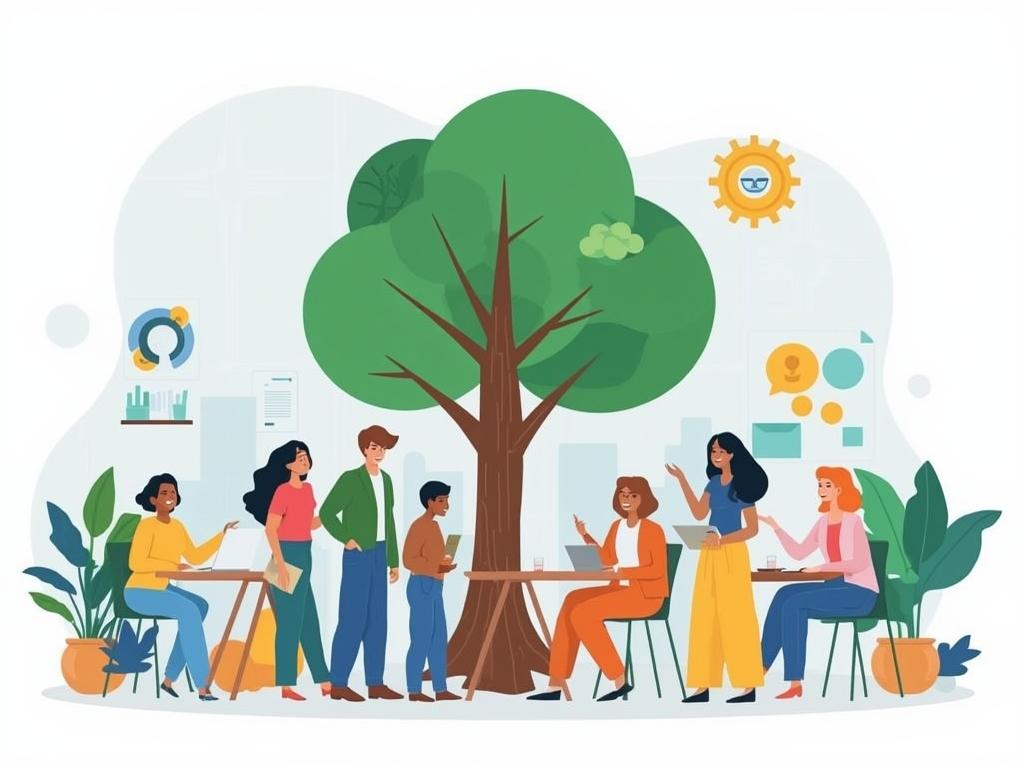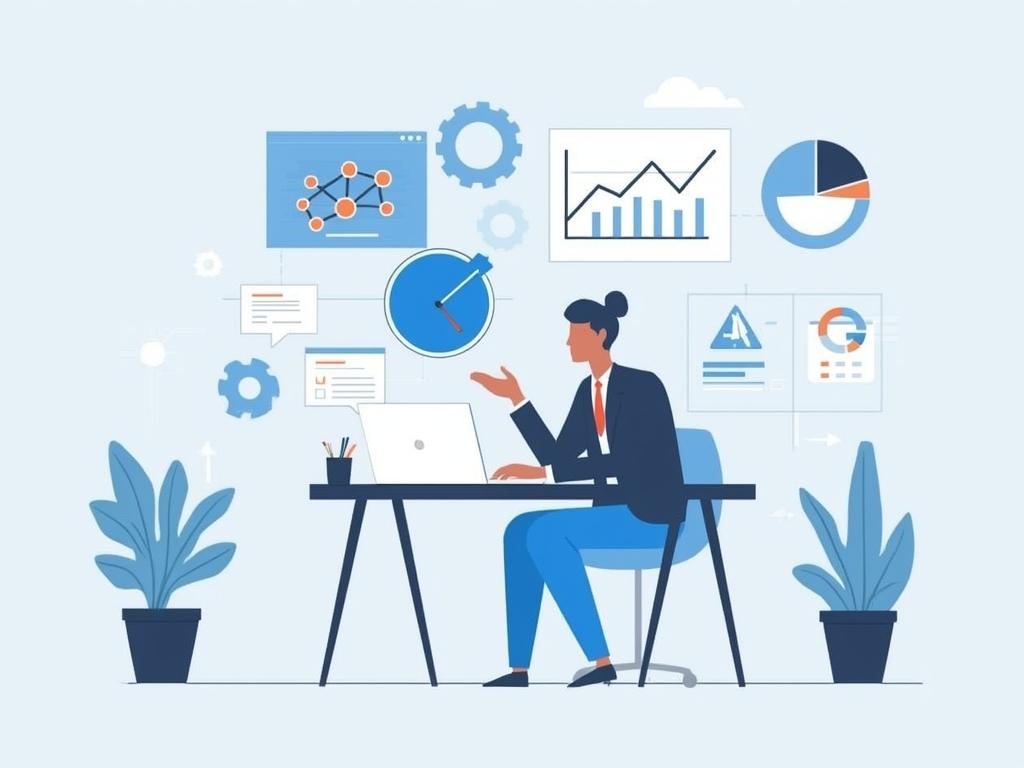Digital Literacy as a Decisive Factor in the Careers of Mature Professionals
Imagine a scenario in which professionals with decades of experience find themselves lost in the midst of digital spreadsheets, videoconference meetings or online collaboration tools. This reality, which once seemed distant, is now a daily challenge for many. A digital literacy has ceased to be a differential and has become a basic requirement of the market, regardless of age or position. But why is this adaptation so crucial for mature professionals? And how can it be the key to staying relevant in an increasingly competitive environment?
What Is Digital Literacy and Why Does It Impact Mature Professionals?
Digital literacy goes beyond knowing how to use a smartphone or send emails. It is the ability to understand, use and create solutions using digital technologies, from basic software to complex data analysis platforms. For more experienced professionals, this adaptation can be challenging, but it also represents a unique opportunity to professional reinvention.
A civil engineer, for example, who used to rely on manual drawings, now needs to master tools like AutoCAD or BIM. An accountant, used to physical books, must be familiar with cloud-based financial management systems such as QuickBooks or SAP. Resistance to these changes can limit opportunities and even lead to career stagnation.
In addition, companies are prioritizing candidates who demonstrate technological versatility. A study of the LinkedIn revealed that 80% of employers consider digital skills to be just as important as traditional technical skills. If you're wondering how to get started, the answer is simple: identify the most commonly used tools in your field and dedicate yourself to learning them. Platforms such as Coursera, Udemy It is Google Certifications offer affordable and practical courses.
Finally, digital literacy is not just about tools, but about mentality. Being open to learning, making mistakes and constantly evolving is what separates the professionals who adapt from those who fall behind. How about seeing this challenge as a chance to grow, rather than an obstacle?
How Lack of Digital Skills Can Isolate Professionals in the Marketplace
Have you ever felt excluded from a meeting because you couldn't share your screen or access a document online? Situations like these are increasingly common and can undermine the confidence and credibility of mature professionals. Lack of familiarity with basic technologies, such as Google Workspace, Microsoft Teams or even professional social networks, creates an invisible barrier in the corporate environment.
Advertising
A real case is that of Maria, an HR manager with 25 years' experience. She had mastered traditional recruitment processes, but when the company migrated to AI-based CV analysis platforms such as LinkedIn Talent SolutionsShe felt lost. Without training, her performance dropped and she ended up being passed over for promotions. Stories like hers show how resistance to technology can be costly.
Another problem is age prejudice. Many employers mistakenly assume that older professionals are unable to learn new technologies. This stereotypical view can be combated precisely by demonstrating digital skills. Want to prove you're up to date? Maintain an active LinkedIn profile, participate in webinars and show that you are engaged with industry trends.
On the other hand, companies also have a responsibility in this process. Offering continuous training and create a culture of patience and collaboration is essential for integrating multigenerational teams. If you're a manager, reflect: is your company prepared to support the digital transition of all employees?
The Main Digital Tools Every Mature Professional Should Master
Not everyone needs to be an expert in programming or data analysis, but there are universal tools that have become indispensable in today's market. Let's start with the basics: productivity packages. Master Excel, Google Sheets or PowerPoint is no longer optional. These platforms are used daily for reports, presentations and project management.
Another valuable skill is the use of remote communication tools. With the home office consolidating, knowing how to manage meetings in the Zoom, Microsoft Teams or even in Slack is essential. Imagine having to lead a team spread across different time zones without understanding how to schedule a video conference? Situations like this can be avoided with a little practice.
For professionals in leadership positions, platforms for project management as Trello, Asana or Monday.com are excellent for organizing tasks and tracking team progress. These tools are intuitive and can be learned in a few hours with online tutorials.
Last but not least is the digital presence. Having a well-built profile on LinkedIn, know how to use social networks for networking or even understand notions of personal marketing can open unexpected doors. Have you ever wondered how a strategic post can attract the attention of a recruiter?
Practical Strategies for Learning Technology without Fear
Learning something new can be intimidating, especially when it comes to technology. But the good news is that there are effective methods to make this process smoother. The first step is break learning down into small steps. Instead of trying to master Excel in a day, start with basic formulas like SOMA It is AVERAGE.
Another valuable tip is look for courses with accessible language. Platforms such as Bradesco Foundation It is Senai offer free training aimed at adults who are just starting out in the digital world. If you prefer to learn at your own pace, YouTube channels such as Video Course have didactic lessons on various topics.

Don't underestimate the power of daily practice. Set aside 15 minutes a day to explore a new function in your work software. For example, if you use Outlook, try creating automated email rules. Small achievements like this increase confidence and reduce anxiety.
Finally, don't be afraid to ask for help. Younger colleagues are often willing to share knowledge. How about proposing an exchange? You teach them about market experience and they help you with technology tips. Everyone wins!
How Digital Literacy Can Rejuvenate Your Career
Mastering new technologies not only prevents professional obsolescence, it can also rekindling opportunities that seemed lost. One example is Carlos, a 55-year-old salesman who learned to use the CRM Salesforce. As a result, he not only improved his performance, but was promoted to team coordinator for his ability to train other colleagues.
Another benefit is expanding contact networks. Platforms such as LinkedIn It is Meetup allow you to connect with professionals from all over the world, take part in relevant discussions and even be found by headhunters. Have you ever thought about how a well-optimized profile can put you on the radar of big companies?
In addition, digital skills open doors to new forms of work. Freelancing, online consulting and even digital entrepreneurship become viable when you master tools like Canva (design), Mailchimp (marketing) or WordPress (website creation).
Finally, there is motivation factor. Learning new things keeps the mind active and brings a sense of achievement. It's no surprise that many mature professionals report feeling more engaged It is less stressed after overcoming their fear of technology.
The Role of Companies in the Digital Inclusion of Mature Professionals
While professionals have a responsibility to keep up to date, organizations also need to do their part. A culture of continuous learning is essential for retaining experienced talent. Programs reverse mentoringin which younger employees teach technology to veterans, are an effective example.
Another valuable initiative is offering customized training. Instead of generic courses, how about modules focused on the specific needs of each department? An employee in finance doesn't need the same knowledge as someone in marketing.
In addition, companies must avoid stereotypes. Mature professionals bring soft skills such as resilience, leadership and strategic thinking. Combined with digital skills, these qualities become a competitive edge.
Finally, leaders must setting an example. If a manager shows an interest in learning new technologies, the team tends to follow suit. How about starting a study group or innovation club in your company?
Tips for Keeping Up to Date in an Ever-Changing Digital World
Technology evolves rapidly, and what is relevant today may be obsolete tomorrow. Therefore, keeping up to date should be a constant habit. A simple way to do this is subscribe to newsletters from sites like TecMundo or Canaltech. They provide weekly summaries of news without requiring a lot of reading time.
Another strategy is participate in online communities. Forums like Reddit or groups on Facebook It is WhatsApp bring together professionals to discuss tools and trends. These spaces are great for answering questions and discovering shortcuts.
It's also worth try out new tools on your own. Many platforms, such as Notion or CanvaThere are also free trial versions. Dedicate a few hours a month to exploring something new - you may be surprised by what you discover.
Finally, don't ignore the human side. Technology is a tool, not a substitute for relationships. Use it to boost your connectionsbut not to replace them. After all, no AI can replicate the experience and empathy of a mature professional.
Conclusion
Digital literacy is not a threat, but a opportunity for reinvention. Whatever your age or area of activity, investing in technological skills is a guarantee of your place in an increasingly dynamic market. How about starting today? The future belongs to those who adapt.



